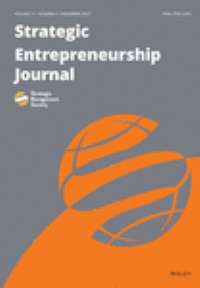补充货币和企业家精神:支持肯尼亚非正式定居点的微型企业家
IF 6.3
2区 管理学
Q1 BUSINESS
引用次数: 0
摘要
全世界有超过10亿人居住在非正式定居点,微型企业家对地方经济至关重要。辅助性货币已经成为支撑这些企业家的工具,提供了替代的交易和支付选择。本研究探讨了肯尼亚非正式定居点微型企业家使用数字补充货币Sarafu的日常策略。我们的研究结果表明,互补货币作为外部推动者,通过增强支付系统、影响供需和改变定价结构来改变当地经济。重要的是,当与储蓄集团整合时,它们提供了金融包容性和集体目标,加强了当地的商业网络。本研究丰富了我们对微型企业家利用互补货币促进增长机制的理解,强调有必要进一步探索互补货币在支持创业方面的作用。本文章由计算机程序翻译,如有差异,请以英文原文为准。
Complementary currencies and entrepreneurship: Sustaining micro-entrepreneurs in Kenyan informal settlements
With over a billion people inhabiting informal settlements worldwide, micro‐entrepreneurs are vital to local economies. Complementary currencies have emerged as tools to sustain these entrepreneurs, providing alternative trading and payment options. This study explores the daily strategies of micro‐entrepreneurs in Kenyan informal settlements using the digital complementary currency Sarafu. Our findings reveal that complementary currencies act as external enablers, transforming the local economies by enhancing payment systems, influencing supply and demand, and altering pricing structures. Significantly, when integrated with savings groups, they provide financial inclusion and collective purpose, strengthening local business networks. This research enriches our understanding of the mechanisms micro‐entrepreneurs deploy to leverage complementary currencies for growth, emphasizing the need for further exploration into the role of complementary currencies in supporting entrepreneurship.This study explores how a complementary currency called Sarafu benefits micro‐entrepreneurs in Kenyan informal settlements. Sarafu acts as catalysts for entrepreneurship by boosting local markets and empowering community cooperation. Our findings reveal that micro‐entrepreneurs use Sarafu to adapt to the unique challenges of informal economies. They employ smart strategies like flexible pricing and inventory management to keep Sarafu flowing smoothly. Sarafu serves a dual purpose: a means of immediate spending and a tool for saving and growing capital. It also strengthens local business networks and creates a sense of collective purpose. For practitioners, this study suggests using complementary currencies to support local business networks, promote collective savings, and align the issuance of complementary currencies with local assets to foster sustainable entrepreneurship in informal economies.
求助全文
通过发布文献求助,成功后即可免费获取论文全文。
去求助
来源期刊

Strategic Entrepreneurship Journal
Multiple-
CiteScore
11.10
自引率
1.60%
发文量
31
期刊介绍:
The Strategic Entrepreneurship Journal is a research journal that publishes original work recommended by a developmental, double-blind review process conducted by peer scholars. Strategic entrepreneurship involves innovation and subsequent changes which add value to society and which change societal life in ways which have significant, sustainable, and durable consequences. The SEJ is international in scope and acknowledges theory- and evidence-based research conducted and/or applied in all regions of the world. It is devoted to content and quality standards based on scientific method, relevant theory, tested or testable propositions, and appropriate data and evidence, all replicable by others, and all representing original contributions. The SEJ values contributions which lead to improved practice of managing organizations as they deal with the entrepreneurial process involving imagination, insight, invention, and innovation and the inevitable changes and transformations that result and benefit society.
 求助内容:
求助内容: 应助结果提醒方式:
应助结果提醒方式:


